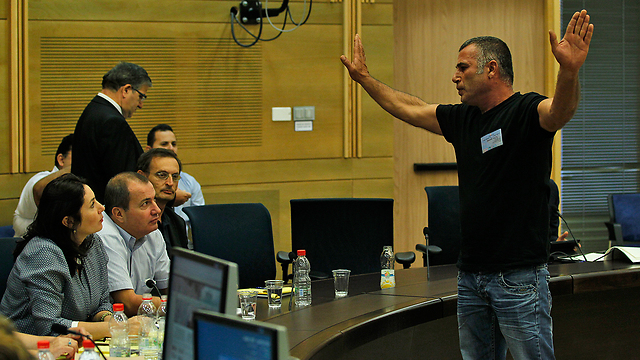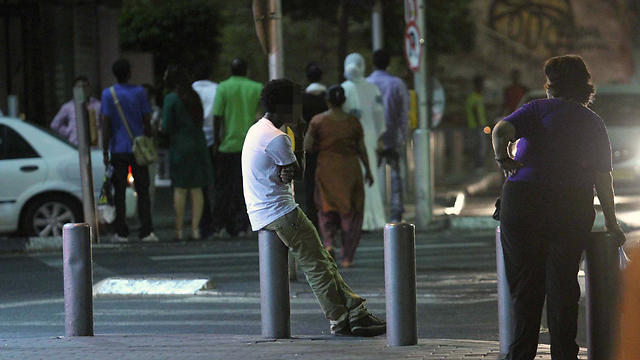
South TA resident: I'd be more protected as infiltrator
High Court's striking of law allowing detention of infiltrators for three years without trial prompts representative of south Tel Aviv communities to accuse authorities. ‘Where were you on Yom Kippur?’ he asks, saying that migrants were barbecuing outside his house during the fast
A day after the High Court ruling on the cancelation of the law to incarcerate infiltrators for three years without trial, Oved Hugi, a representative of the south Tel Aviv community stood up at a Tuesday Knesset meeting, crying out: "Where were you on Yom Kippur? They were doing barbecues outside my house."
He then approaced the committee members and placed his ID card on the table in front of the committe chair. "I want to return my ID card, and I would like an Infiltrator identity card, so that everyone will protect me. Stop living your fantasy. They came in to be criminals; they don't give a damn, it’s getting old.”
Related stories:
According to Hugi, who is eighth on the Likud list for the upcoming municipal elections, "The level of crime in south Tel Aviv is among the highest in the world. On Yom Kippur, we sat in fear in our homes and synagogues when outside, infiltrators were barbecuing, playing music, were drunk, with bottles flying and breaking, and this is how it was also on Holocaust Memorial Day and Memorial Day.”
After the Knesset meeting, he told Ynet that he was born in the Hatikva neighborhood, and in recent years life there had turned to hell, as he described it. "The government and the judiciary system have abandoned us. The judges ruled, but they are cut off from the people and they never came to hear us.”
“We succeeded in decreasing the number of infiltrators and are worried that there will be a renewal of the phenomenon of the arrival of new infiltrators,” Amnon Ben Ami, director of the Population, Immigration and Borders Authority, said at the meeting of the Interior Committee of the Knesset, which discussed the amendment's nullification.
Oved Hugi gesticulates in front of Knesset committee members (Photo: Atta Awisat)
"The crux of our plan was this amendment. After the Attorney General okayed the return to the implementation of the 'willful emigration' directive, the government began deporting hundreds of them monthly to a third country, but the plan worked only with the Prevention of Infiltration Law. The secretary of the United States Department of Homeland Security said – don’t trust the fence, and they have experience in this field in the US."
According to him, "We managed to reduce the number of infiltrators. Over the past few months, we interviewed those in custody in order to review their refugee status. It awaits a committee that examines each case individually. A discussion of each case takes hours and dozens of cases are pending. They're reviewing them; it's done in an orderly process.”
Legislation
Committee chair MK Miri Regev (Likud Beiteinu) commented on the ruling of the High Court, asking how it could be that in the four years that the government had been working on the legislation, no legal authority mentioned that there might be a problem with the law. “We are trying to understand how it is that given the numerous legal advisors, no one came forth and said that this law was disproportionate.”
The Prevention of Infiltration Law was approved in the Knesset for the first time in January 2012, and since, legal debate has surrounded its constitutionality. In actuality, the current law was an amendment to a 1954 legislation, which increased restrictions placed upon refugees arriving in Israel from Eritrea and Sudan. According to the new amendment, the law, which was intended to deal with terrorists, now also applies to asylum seekers, and would allow the holding of an infiltrator in a detention facility for up to three years.
On Monday, an expanded panel of nine High Court justices unanimously ruled that the amendment to the Prevention of Infiltration Law allowing the detention of infiltrators for up to three years without trial, was unconstitutional.
Typical south Tel Aviv (Photo: Ido Erez)
According to the judges, the arrangement disproportionately harmed the constitutional right to freedom set forth in the Basic Law: Human Dignity and Liberty. The amendment to the Infiltration Law was initiated by Prime Minister Benjamin Netanyahu.
Following Monday’s ruling, the cases of the some 2,000 infiltrators currently in detention, will undergo re-examination, in order to assess and release those in custody. The end-point for the examination process has been set for 90 days from the date of the ruling.
Earlier Tuesday, the Egyptian newspaper Al-Yom A-Saba reported that a senior Israeli defense official visited Cairo, to discuss the Sinai situation with his Egyptian counterparts, including the issue of smuggling and infiltration.
Roi Kais contributed to this report
- Receive Ynetnews updates directly to your desktop












